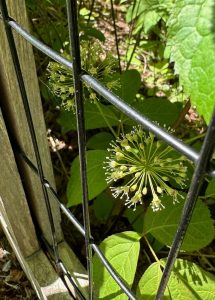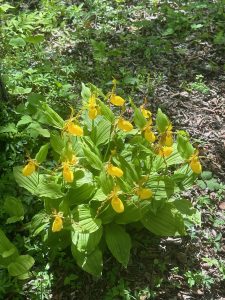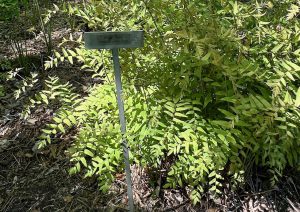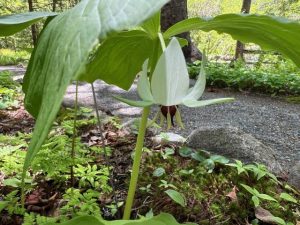Master Gardener Volunteers of Hancock County Newsletter – June 2024
Table of Contents
GETTING TO KNOW MG ADVISORY / MEET JODY BLAKE/ MEET JIM BRADLEY / WILD GARDENS OF ACADIA / WILD ONES / GARDEN CLUB PHOTO CONTEST! / PLANT DIAGNOSTICS UPDATE
Upcoming Dates to Remember!
June 15 Native Gardens of Blue Hill – Plant Sale
June 19 Juneteenth – Office Closed
GETTING TO KNOW OUR MGV ADVISORY MEMBERS!
This month we continue introducing you to members of the Master Gardener Volunteer Advisory Committee (MGVAC)
Meet Jody Blake ~ MGV 19′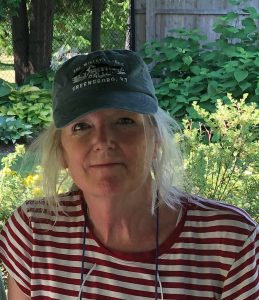
I grew up in Connecticut and developed an interest in gardening from my mother, who was more often found up a tree pruning rather than digging in the dirt. I went to college in Connecticut and grad school in New York City, where I stayed and worked for 8 years. Not much gardening there amidst the cement, but I did take a Fundamentals of Gardening course at The New York Botanical Gardens.
Work brought me back to Connecticut and I had the luxury of 2 acres on which to garden, and a wonderful brook cascading down over the rocks, making several ponds along the way. But I was leaving in the dark and coming home in the dark. Little time for kids and gardens. When asked why I was leaving Aetna, I said “I’m going home to weed my garden.”
Eventually, my family moved to Maine for a job opportunity for my husband. I joined my local Garden Club and a few other organizations, but nothing exciting until the Master Gardener Volunteer Program. The program is designed to train volunteers for horticulture and food system-related community service projects. When I applied to be in the program, I thought I would learn about gardening. I did learn a tremendous amount, but it also opened me up beyond my original interests, and for that, I will always be grateful. My volunteer work has been primarily at the Hancock County Extension Gardens. I have made many new friends and gardening colleagues and was honored to be asked to serve on the MGV Advisory Committee.
Whenever I’m asked what the Master Gardener Volunteer program is about, I say “It’s a lot of good people doing a lot of good things”. That’s the best description I have of the program. I’m not your typical Master Gardener, but there is no typical Master Gardener. That’s one of the reasons I love the program. I’m a proud member of the class of 2019. Marjorie Peronto was our fearless leader who somehow was able to successfully teach a comprehensive class curriculum to people with different backgrounds, ages, abilities, and experiences. She is an amazing talent.
This is an exceptional program in so many ways, with so many exceptional people working within it. Again, I am so grateful to be a part of it.
Meet Jim Bradley ~MGV 14′ 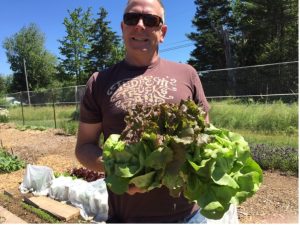
When I took the Master Gardener Volunteer training 10 years ago, I was looking to ‘scratch an itch’. Home gardening was something I’d made some small attempts at, but I felt like there was a bunch I didn’t know. Boy, was I right!
Ten years later, I’m still learning something new each time I set out on a volunteer project. Whether propagating plants, figuring out the proper soil amendments, finding clever ways to ward off pests, or extending the Maine growing season, a lifetime of learning is possible!
Outside of the vegetable-growing focus I originally trained for, I’ve grown to truly appreciate native landscapes and organic gardening methods. I’ve developed an awe for Maine’s diverse ecoculture and have found ways to improve my own environmental impact.
But being a Master Gardener Volunteer goes way beyond instilling a green thumb in a trainee. The projects I’ve been a part of have provided thousands of pounds of fresh native produce to food pantries, soup kitchens, homeless shelters, and health advocacy groups. I’ve been able to share my love of gardening with youth and elders alike.
I’ve been able to work on a wide range of projects, including the Cooperative Extension Native Landscape, the Hancock Community Garden’s Maine Harvest for Hunger, the Hancock County Food Drive, the Eastern Maine Aids Network gardens, Apple Gleaning, and the Camp Discovery Organic Garden at YMCA Camp Jordan. I’ve also been involved with the Master Gardener Volunteer Advisory Committee.
Looking back over the last 10 years, though, the most significant benefit I’ve gleaned from my time as a Master Gardener Volunteer are the lasting friendships I’ve made. Nothing gets you out with your neighbors like spending Sunday morning in a vegetable garden, working together for a common goal, and socializing the whole time!
And, I’m happy to say… I still have a lot to learn!
Highlights from the Wild Gardens of Acadia Field Trip
On May 25th, twelve of us gathered for a guided tour of The Wild Gardens of Acadia at Sieur de Monts Spring. The mission of the Garden is “Displaying, preserving, and propagating Acadia’s native flora” and the tour was led by our own Helen Koch, who has been a volunteer there for many years. It was a beautiful day and Helen was an amazing and gracious guide, with a fount of knowledge.
The gardens are divided into 13 areas, each mimicking the growing conditions found within different areas of the park and there are lovely paths among them. I am a volunteer at Native Gardens of Blue Hill, so I saw a lot of plants that I was familiar with, as well as many that were new to me. Helen began our tour by explaining a little about the park and passing around some recommended reference books, and then gave us all the little pamphlet that explained each area.
I think each of us had our favorite areas and plants. The Large Yellow Lady’s Slippers (Cypripedium parviflorum var. pubescens) were in bloom and a treat to see. The fern path is wonderful. Helen showed us how we could identify the Interrupted Fern (Osmunda claytoniana), which is hard to understand from just a written description; and includes a fern I had never seen before, the Royal Fern (Osmunda regalis), which is distinctively un-fernlike as it looks like a shrub with leaflets that resemble something in the pea family. There is a Bear Oak (Quercus ilicifolia), a short, knarly mountain top tree that gets its name from bears who feed on its acorns, not its short stature. It’s a garden for everyone, but especially for native plant lovers and those interested in woodland plants. I was delighted to see the bloom on the wild sarsaparilla (Aralia nudicaulis). I have them everywhere and I always have to look them up to make sure they are not poison ivy; but I had never seen them flower.
Helen was the perfect host and provided us with water and snacks when the tour was done; and she sent us all emails to tell us about the plant sale and a couple of plants, including Nodding Trillium (Trillium cernuum), which she forgot to show us. Kudos to Helen!
- Nodding Trillium ~Trillium cernuum
Recommended Reference Books: Natural Landscapes of Maine by Susan Gawler and Andrew Cutko, Forest Trees of Maine by the Maine Forest Service, and The Plants of Acadia National Park by Glen H. Mitttelhause, Linda L. Gregory, Sally C. Rooney, and Jane E. Weber.
The Wild Gardens of Acadia Plant Sale (including natives, perennials, annuals, and vegetables): June 15th, 9 a.m. to Noon at St. Saviour’s Church in Bar Harbor. (cash & checks only) They’re doing their best to prevent the spread of jumping worms, so the sale will be smaller than in years past. Proceeds help to fund the maintenance and operations of the Garden.
https://friendsofacadia.org/get-involved/events/wild-gardens-acadia-plant-sale/
Wild Ones Certified Native Habitat Program
Looking for another way to certify your native garden? You can join Maine’s only chapter, Wild Ones Midcoast Maine Chapter here: https://midcoastmaine.wildones.org/ and follow the directions below.
Certification Criteria
To qualify for a Certified Native Habitat, your garden should:
- Belong to an active Wild Ones member
- Be working towards a goal of at least 75% native plant species in your managed habitat area
- Support local wildlife and pollinators
- Follow regenerative gardening practices- these are environmentally conscientious approaches to managing and planting gardens and habitats
How to Register
- Certify Your Habitat: Before submitting your application, ensure your habitat meets our certification criteria above such as working towards a goal of at least 75% native plants and providing local ecosystem support.
- Submit your application: Complete your certification through our secure online platform. Wild Ones Habitat Certification is only open to Wild Ones members, so make sure to log in with your member account.
- Certify for a fee of $50. What you receive: The certification fee covers the cost of the certification process. a token of our appreciation and to help promote awareness, you will also receive a sign for your garden that signifies your commitment to supporting native habitats.
For more information: https://wildones.org/cnhp/
Photography Contest
Photographers who are members of a local Garden Club, take note:
The folks at GCFM (Garden Club Federation of Maine) want you to know about the New England Garden Clubs Photo Contest, which is only open to members of federated clubs of New England. That includes Surry, and probably Blue Hill, Ellsworth and any other town in our counties that you pay dues to.
NE Garden Clubs, Inc. 2024 Photo Contest Trees are the Poems that the Earth Writes upon the Sky by Khalil Gibran
Entries open May 1st, 2024 & close August 31st, 2024
Enter Here!; This is a juried show. Click to read more about the rules.
There will also be a virtual lecture on July 13th featuring Jim Zuckerman on “Capturing Outstanding Images” and Seth Seth Resnick on “Unleashing Creativity”. The link to the registration page is https://necccphotoconference.org/.
In case you didn’t hear ~
UMaine Extension plant diagnostic lab shares updates and announces new fees
The University of Maine Cooperative Extension Plant Disease Diagnostic Lab in Orono, which identifies diseases and provides management plans to gardeners, farmers, nurseries, and members of the lawn care industry, received over 800 physical samples from nine different states in 2023. Also last year, the lab launched a new process for digital submission which resulted in 400 additional samples.
For many years, the lab has been able to provide this service to our in-state customers at no cost. However, due to the rising costs of ever-evolving diagnostic tests, the lab is implementing new fees in an effort to recover a portion of its expenses and ensure it can continue to support Maine growers and gardeners.
Starting May 1, 2024, the Plant Disease Diagnostic Lab will charge $18 for general in-state samples. Out-of-state sample fees will be increased to $38. Garlic seed testing fees will increase to $38 for in-state and $68 for out-of-state samples. All digital submissions will cost $8. The lab also offers various specialized tests. Details on all tests and fees can be found on the lab’s webpage.
In 2023, the lab made more first detections of disease in the state than any other year, which included a new fungal disease on tomatoes and fir trees. The lab also provided confirmation testing for beech leaf disease for the Maine Forest Service, confirming the existence of the disease in five Maine counties. The lab added three new molecular tests for improved virus and nematology detection.
The mission of Extension’s Plant Disease Diagnostic Lab is to enhance the success of Maine agricultural industries and gardeners by reducing losses due to disease and minimizing management costs by providing early and accurate disease identification.
Take lots of pictures of your MGV projects!
Send them Sue at sue.baez@maine.edu to save on file for future use.
We are always on the lookout for articles you’d like to see here, or topics you would like to write about. Contact the Chair of the newsletter subcommittee at bluehilldesign@gmail.com.
This newsletter gets sent to 152 people every month. Do you know an MGV who doesn’t receive the newsletter and would like to? Let us know! MGVnewsletterinput@gmail.com
Thank you from
Betsy Adams, Mary Doherty, Nicole Gurreri, Jane Ham, Mary Hartley, and Jan Migneault.

